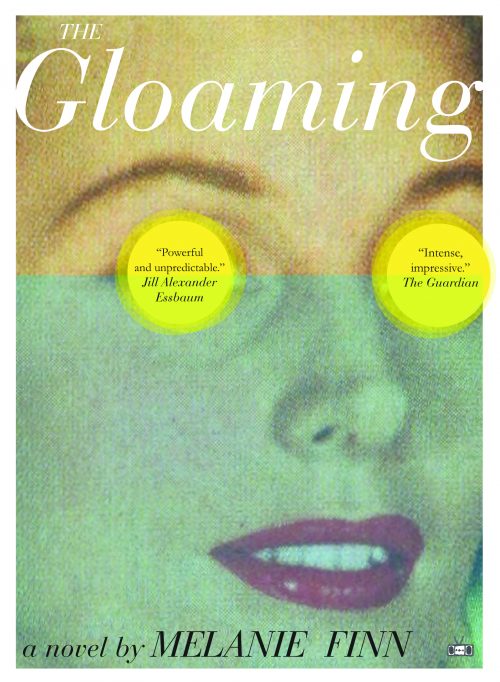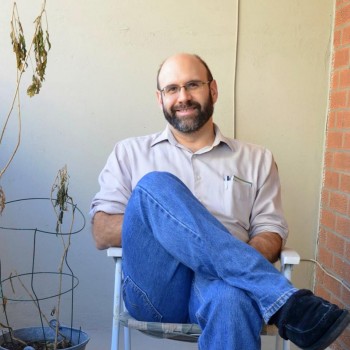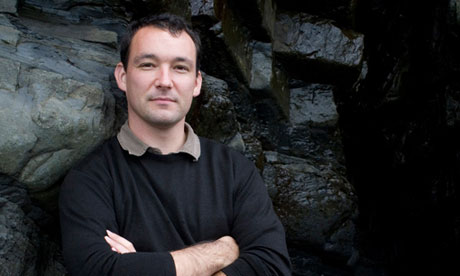
It is at once exhilarating and humbling to see a writer as immensely talented as Melanie Finn take a standard formula and turn it inside out, to subvert it so thoroughly, so brazenly, so originally. –Mark Sampson

The Gloaming
Melanie Finn
Two Dollar Radio, 2016
318 pages, $16.99
.
Stop me if you’ve heard this premise before. A sensitive but troubled character, at or near the threshold of middle age, suffers some major or minor tragedy in his or her life, and, looking for a fresh start, or reboot, or whatever, decides to travel to a far-off and “exotic” land, which, through the sheer scope of its exoticness, its novelty, provides the precise experiences or perspectives that our intrepid protagonist needs to learn something important about him or herself, or life in general, or whatever.
Yes, from Heart of Darkness and The Quiet American to Eat Pray Love, there are many works whereby the allure of foreign landscapes, of exotic adventures, supplies the writer with fecund and fruitful narrative soil. I myself have admired many novels that follow the general template described above, and, yes, even published one myself a couple of years ago. So it is at once exhilarating and humbling to see a writer as immensely talented as Melanie Finn take this standard formula and turn it inside out, to subvert it so thoroughly, so brazenly, so originally, in her new novel, The Gloaming. If you yourself are a writer and thinking about forging your own “going aboard to learn something about yourself” kind of story, you would do no harm to it by reading this small masterpiece. It’s good to know what you’re up against.
Finn certainly holds some serious “foreign land” credentials. Having lived in Kenya until age eleven, she was educated in the United States and engaged in a busy journalism and screenwriting career while living in no fewer than six countries. Beyond her well-received debut novel, Away from You, published in 2004, she is also known for working alongside her filmmaker husband, Matt Aeberhard, to create the acclaimed 2008 documentary film, The Crimson Wing: Mystery of the Flamingos, in Tanzania. Reading The Gloaming, one gets the sense that this is a writer who knows Africa intimately, who understands the rich panoply of its cultures, its histories, its contradictions. To say this novel offers an unvarnished view of Tanzania would be an understatement, and yet there is a raw and terrifying beauty to the abject privation and misery that Finn unpacks in these pages.
The particulars of The Gloaming’s plot do not do justice to the emotional journey it takes the reader on. Our hero, a young, attractive, thirtysomething woman named Pilgrim Lankester (née Jones) is the wife of a successful human rights lawyer named Tom, whose work takes them to various countries around the world. When they end up in Switzerland, Tom meets, falls in love with, and leaves Pilgrim for a younger woman named Elise. Pilgrim, now stranded in a bland Geneva suburb called Arnau, is devastated by both the suddenness of her husband’s betrayal and its sudden flourishing (Tom and Elise have a child together very soon after pairing up). But the real tragedy of Pilgrim’s life is yet to come: while out on a drive, she loses control of her car and slams into a bus shelter, killing three young children on their way to school.
This horrific accident would be bad enough if it had occurred as a result of negligence on Pilgrim’s part and she was declared a Kindermörderin (“child murderer” in Swiss German). But it’s almost worse when the investigation and subsequent court judgment rule that what happened was, in fact, a “no fault” accident. Pilgrim becomes a pariah on the streets of Arnau, receiving regular insults and death threats from the locals, so she decides to flee Switzerland and her divorce and travel to Tanzania. After a guided tour takes an unexpected turn, she disembarks in the impoverished town of Magulu and decides to stay.
Now going by her maiden name, Pilgrim begins to meet a curious swath of characters who are in Tanzania for a variety of noble or ignoble reasons. There is the diminutive doctor, Dorothea, who tries to provide health services to Magulu despite a lack of supplies and a surfeit of superstition. There is the ruthless mercenary from eastern Europe, Martin Martins (his name conjures an allusion to Lolitia’s Humbert Humbert) who spends the early part of the novel referring to Pilgrim as “Princess” and trying to get her into bed. Later, we meet the character of Gloria, an “ugly American” stereotype who has much more going on than what first appears: she is in Africa on humanitarian work after the death of her son, and we soon learn that her grief may hold a key to Pilgrim dealing with her own guilt over the children she killed back in Switzerland.
An air of the damned soon descends over Pilgrim’s journey into the chthonic heart of Africa when a mysterious package arrives in Magulu. The box holds the remains of an African albino – the telltale curse of a witch doctor – and Pilgrim offers to get the box out of town and to its proper recipient. Yet this action prompts a journey that will reveal just how closely associated Pilgrim’s accident back in Switzerland is to the life she is now trying to live in Africa. She will eventually learn that the figurative distance between these two worlds is not as wide as she first thought, and certainly not wide enough for her to escape what she has done.
Indeed, the narrative structure of The Gloaming shows just how tightly linked the place Pilgrim has fled from is to the place she has fled to. For the first sixty per cent of the novel, Finn alternates chapters between what happened in Arnau the previous winter/spring and what is happening to Pilgrim in Africa now. This flipping back and forth is expertly rendered, and in the process we meet two Swiss men who have the largest impact on Pilgrim’s pilgrimage to Tanzania. The first is Paul Strebel, the Geneva detective assigned to investigate the accident that killed the children. Trapped in a loveless marriage to his well-meaning wife, Ingrid, Strebel develops a brief but intimate relationship with Pilgrim during the investigation, and he soon finds himself obsessed with her. The other is Ernst Koppler, the father of one of the dead children. Koppler is a deeply tragic figure – he lost his wife to cancer not long before his daughter is killed in the accident – and he too becomes obsessed with Pilgrim. Strebel eventually learns that Koppler, in his grief, has tracked Pilgrim to Tanzania and is travelling there with perhaps the idea of causing her harm. Lying to his wife about attending a police conference in Iceland, Strebel follows Koppler to Africa in the hopes of intervening in whatever plan he has in store for Pilgrim.
This additional thread is what sets The Gloaming apart from other stories that use the well-worn trope of travelling abroad to escape an unseemly event at home. Most novels, if they tie in the tragedies of the past, do so lightly, symbolically, allowing the present action in the foreign locale to dominate the narrative. Finn has opted for the opposite approach. Instead of having Pilgrim be figuratively unable to escape what happened back in Switzerland, Finn literally makes those events an integral part of her character’s journey. This creates a tightness, an intimacy between the past and the present that is often absent in books with a similar structure. Instead of relying on an “emotional” inability to let go of the past, The Gloaming makes the past an actual character in the present action, affecting events in a very literal sense.
Along the way, Finn shows an adept hand at balancing all the characters she has created, the two landscapes that dominate her book, and the themes that weave their way through it. Every aspect of The Gloaming’s complex structure reveals a clear-eyed vision and a near-perfect execution. The shame and threat of violence hanging over Pilgrim’s appearance in Magulu is almost immediate (there is a scene not long after she arrives when she is briefly terrorized by a gang of children) and reminds us of the atmosphere captured in another great African novel, J.M. Coetzee’s Disgrace. Through just a handful of short descriptions, we get a sense of Pilgrim’s stilted, stunted life as “Tom’s wife,” the way she tried to remain an anonymous cipher so that he could build a successful career: “For hours at any given dinner table I was able to deflect to reveal not a single thing about myself while giving the impression of participating in the conversation.”
There are other resonant flourishes. Finn captures the jingoism and xenophobic paranoia that seems to grip a lot of Swiss culture; her creation of Pilgrim’s mettlesome Arnau landlady is a wonderful view into that. She also does a great job of showing what it’s like to be an itinerant global citizen, the way you can feel at once like a worldly, urbane ladder-climber while at the same time be completely alienated from the succession of adopted homes where your (or, in this case, your spouse’s) career takes you. Yet, in the end, The Gloaming’s penetrating insights into Africa is where it shines best. The vividness, the poverty, the fear that Finn is able to exact upon the page is palpable. One scene stands out in particular. Pilgrim and Gloria are travelling through Tanga in May, looking to visit the Amboni Caves just north of the city. These dark, complex caverns, so reminiscent of the Marabar Caves in E.M. Forster’s Passage to India, hold a deadly legacy: a husband and wife got lost in them while chasing after their errant dog and were not able to find their way out. Pilgrim’s discovery of this from a tour guide becomes full of ominous portent:
The ground without warning, a socket; impossible to see unless you were looking for it; impossible to know its depth. ‘The husband and wife decided to climb in to try to get the dog because they could hear it barking.’ He pauses for effect and to make a small sigh. ‘They were swallowed by the cave. Never seen again. Completely gone.’
This episode is rich in symbolic foreshadowing of what is about to happen to Pilgrim in Africa, what the continent itself is threatening to do to her.
And then a curious thing happens around page 175 of this 310-page novel. Finn diverts from Pilgrim as her protagonist and dedicates each of the remaining chapters to one of the secondary characters we have already met. It’s a daring narrative risk, but one that succeeds by the sheer luminosity of The Gloaming’s prose and character insight. By ditching Pilgrim’s singular, centralized viewpoint, Finn is able to flare out the wider aspects of this story like a fan, giving us much more access the book’s narrative arc. The strongest of these chapters is the ones focused on Strebel. We get a profound sense of his struggling marriage, the dangers and inanities of being a police detective, and just how deeply he falls in love with Pilgrim during their one, brief sexual liaison. By the time we are finished with his sections of the book, we feel as if we know Strebel just as well as we have come to know Pilgrim herself. Dorothea, Gloria, and even Martin Martins get their own chapters of varying length, and with each switch in the point of view we realize just how immersed Finn is in the lives of all these characters, and how close to the surface each of them remain in her story.
The Gloaming, in the end, defies convention and carves a new and innovative path for itself in the canon of expat literature. Finn has fashioned a book that is rich, dark, engrossing and infinitely complex – much like the continent it spends many of its wonderful pages portraying.
—Mark Sampson
N5

Mark Sampson has published two novels, Off Book (Norwood Publishing, 2007) and Sad Peninsula (Dundurn Press, 2014), a short story collection, The Secrets Men Keep (Now or Never Publishing, 2015), and a collection of poetry, Weathervane (Palimpsest Press, 2016). His new novel, The Slip, is forthcoming from Dundurn Press in 2017. Mark’s stories, poems, reviews and essays have appeared in numerous literary journals throughout Canada and the United States. Originally from Prince Edward Island, he now lives and writes in Toronto.
 Author photo by Mark Raynes Roberts
Author photo by Mark Raynes Roberts





